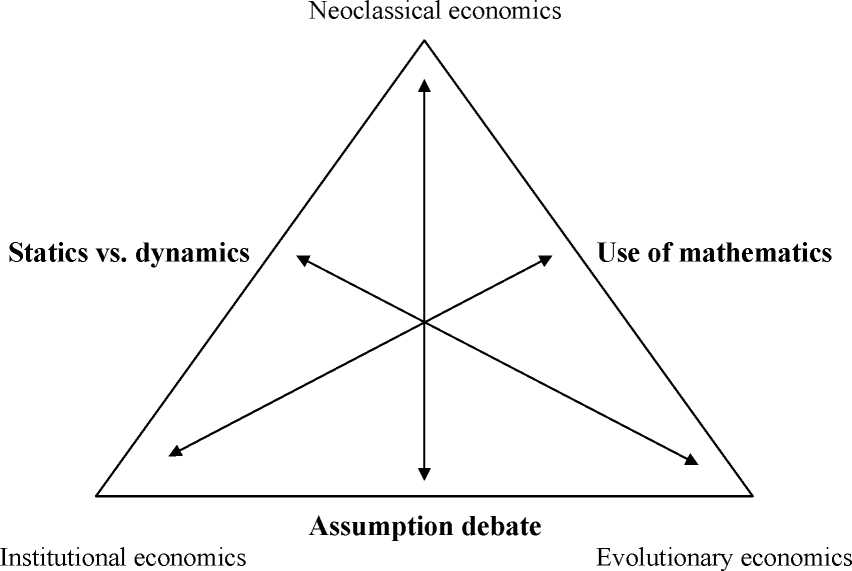economists advocating a ‘new economic geography’ and economic geographers adhering to institutionalist
concepts and methodologies. We will proceed by first discussing the three debates in economics, and only
then discussing the current Methodenstreit in economic geography.
Though primarily for heuristic reasons, and without any claim to summarise these various debates
accurately, we distinguish between three main debates. As illustrated in Figure 1, each of these debates
‘unites’ two of the three approaches and differentiates them from the third. The first debate centres on,
what has become known as, the assumption debate. Evolutionary and institutional economists have
criticized the neoclassical assumptions of maximizing individuals with perfect information. The second
debate concerns the usefulness of mathematical modelling which unites, to some extent, evolutionary and
neoclassical scholars, but which is opposed almost by nature by most institutionalists. The third recurrent
debate has been labelled ‘statics versus dynamics’. Here evolutionary approaches take a critical stand
toward the static analyses of neoclassical and institutionalist approaches. Again, we would like to stress
that the differentiation of economic theorising in three approachs solely serves a heuristic purpose. In fact,
recent theorising in economics seems to occur at interfaces between two theories rather than purely within
a theory. For example, experimental economics not only focuses on strategic rational choice behaviour,
but also how emotions and routines affect decision-making. And game theory recently shifted from static
analysis (backward induction) to evolutionary analysis (learning by trial and error) (Friedman, 1998).
Figure 1. Three debates within the triangle of neoclassical, institutional, and evolutionary economics

More intriguing information
1. Synthesis and biological activity of α-galactosyl ceramide KRN7000 and galactosyl (α1→2) galactosyl ceramide2. The name is absent
3. The Nobel Memorial Prize for Robert F. Engle
4. Tax Increment Financing for Optimal Open Space Preservation: an Economic Inquiry
5. Input-Output Analysis, Linear Programming and Modified Multipliers
6. KNOWLEDGE EVOLUTION
7. Design and investigation of scalable multicast recursive protocols for wired and wireless ad hoc networks
8. Fortschritte bei der Exportorientierung von Dienstleistungsunternehmen
9. The name is absent
10. The name is absent